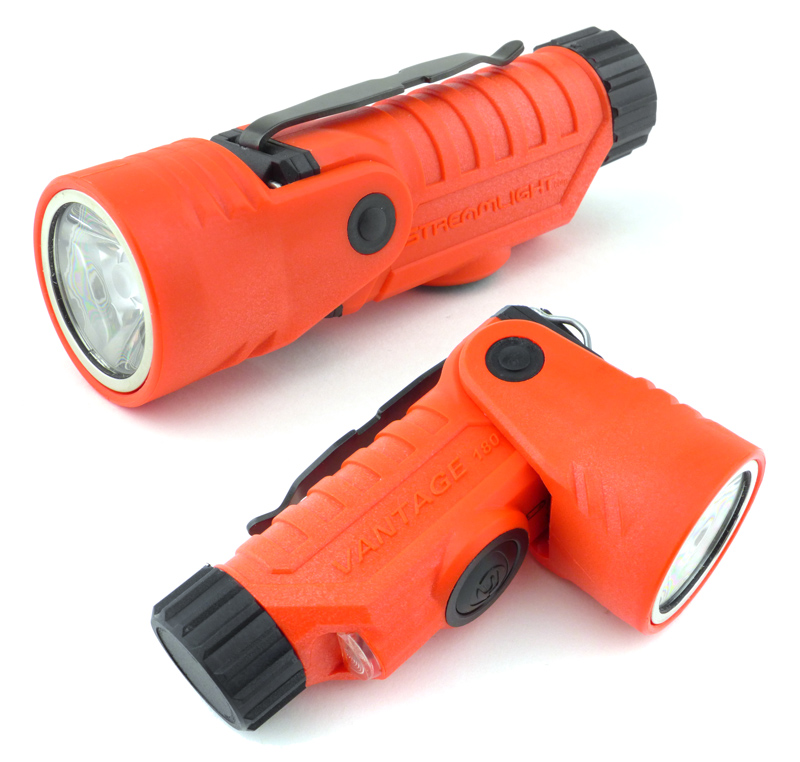Streamlight make some of the most useful articulated-head lights I’ve ever used. Lights like the Knucklehead, and Sidewinder bring an extra level of functionality with their adjustable heads. For this reason I was particularly excited to get my hands on their latest articulated light, Streamlight’s Vantage 180.
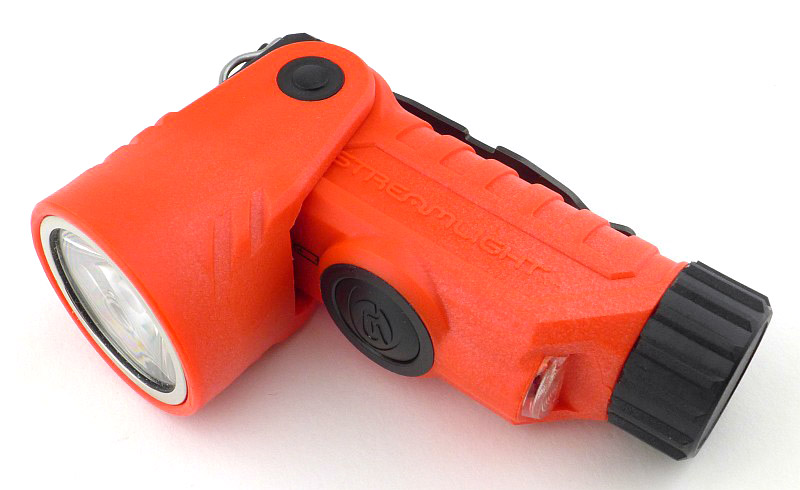
Taking a more detailed look:
The Vantage arrives in a cardboard box.

Inside is the Vantage 180, a pair of Streamlight branded CR123s, the helmet mount with Allen key, plus the instructions.
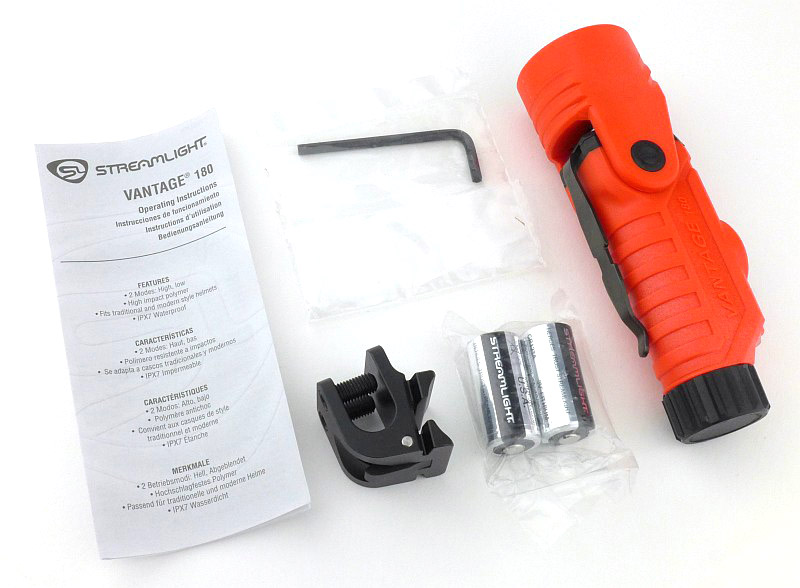
And here we have the, very orange, Vantage 180. On this side it has ‘Streamlight’ written.

On the other side it has ‘Vantage 180’.
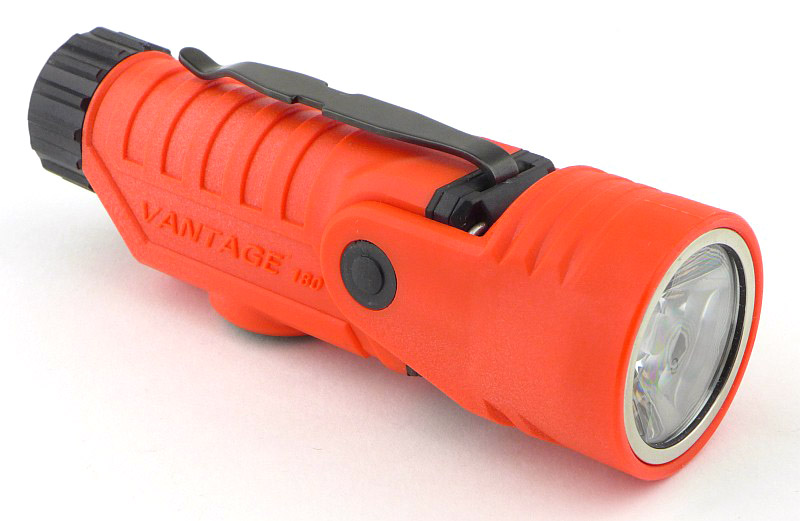
Laying the Vantage 180 on its side shows where the switch is positioned. As you would expect, it is on the opposite side to the clip.
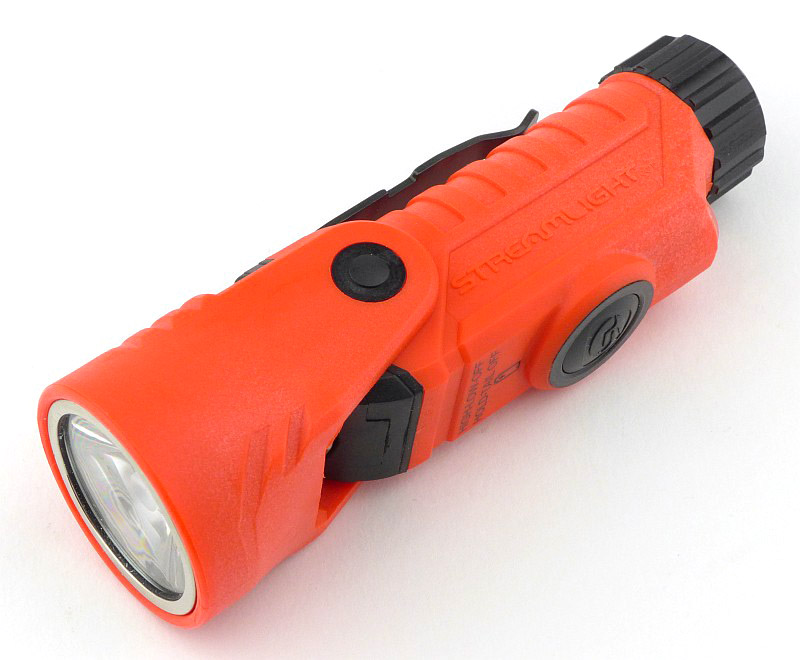
And now we get to the reason for the ‘180’ in the name. Here the head has been rotated 90 degrees to the front.
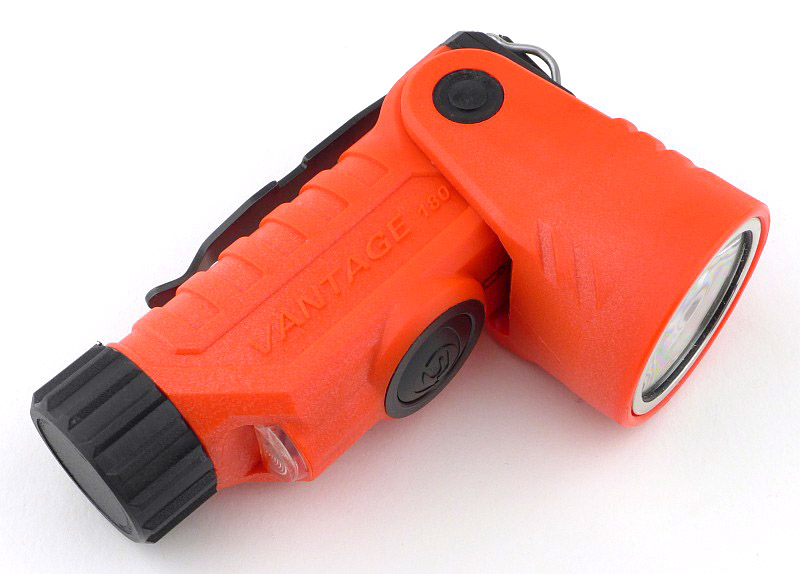
Then from the previous position, the head rotates a full 180 degrees all the way to the back. There are no click stops, instead it is held in place by friction, so the head can be adjusted to any angle between these two extremes.
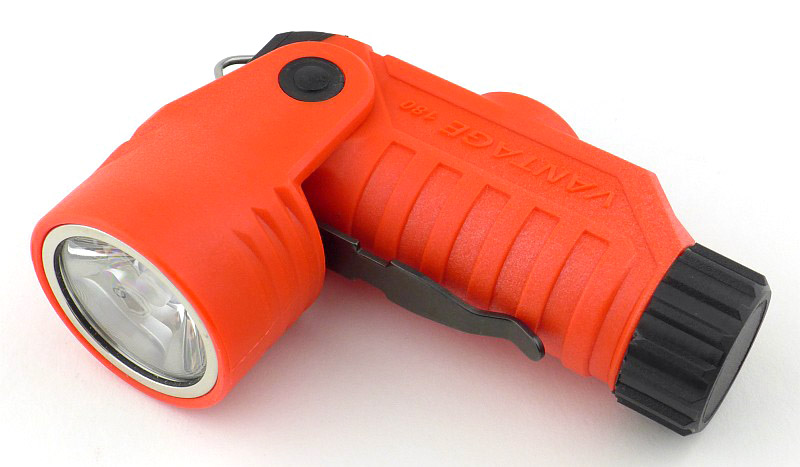
With the head either fully forward or backwards you can access the built-in turn out gear hook / hanging loop.
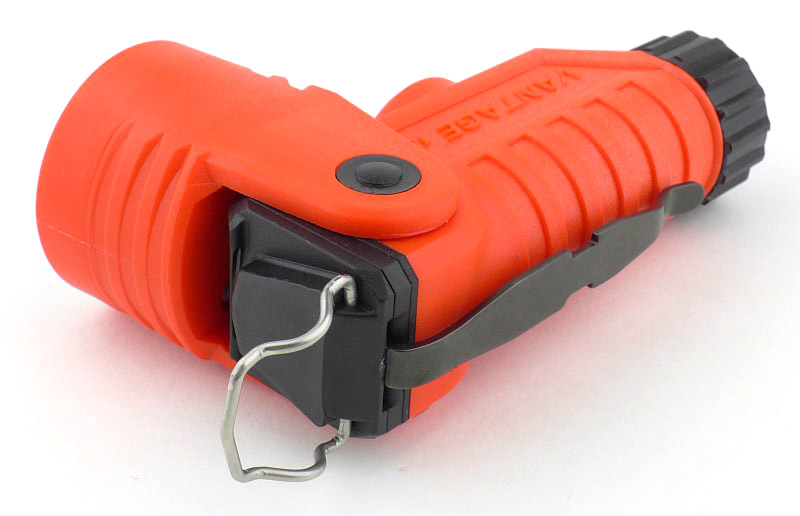
While we are looking at attachment options, there is a special helmet mount included with the Vantage 180. It is an anodised aluminium block with a few special features.

There is a deep helmet rim clamp. Using the supplied Allen keys, these two grub screws are backed right out to allow the mount to be placed over the rim of the helmet. This is specifically designed to fit US issue helmets, so might have limited success on other helmet designs around the world.
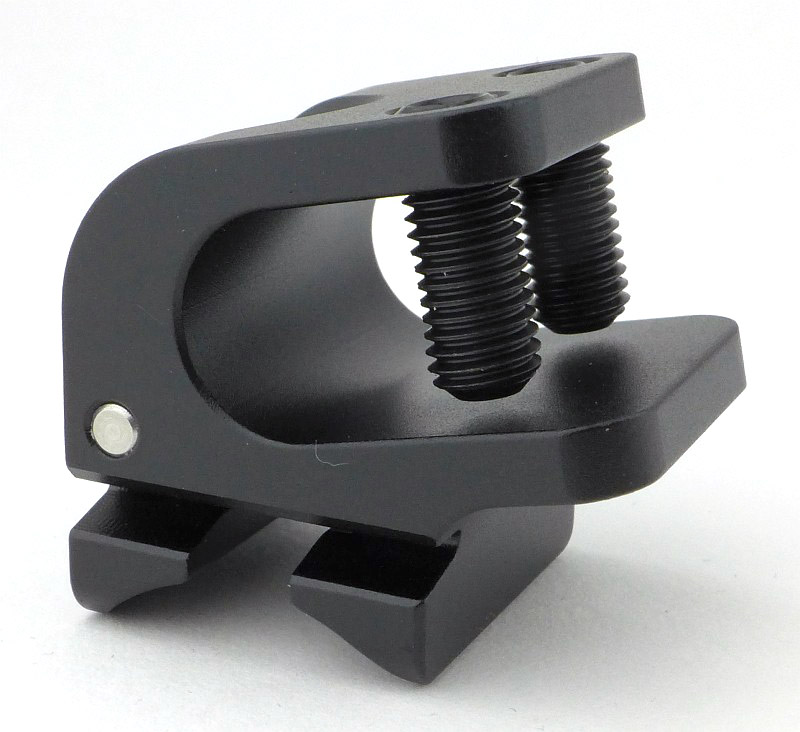
Then there is the side onto which the Vantage 180 clips. The round section fits against the Vantage 180’s body, and the T-shaped groove will allow the pocket clip to slide through.
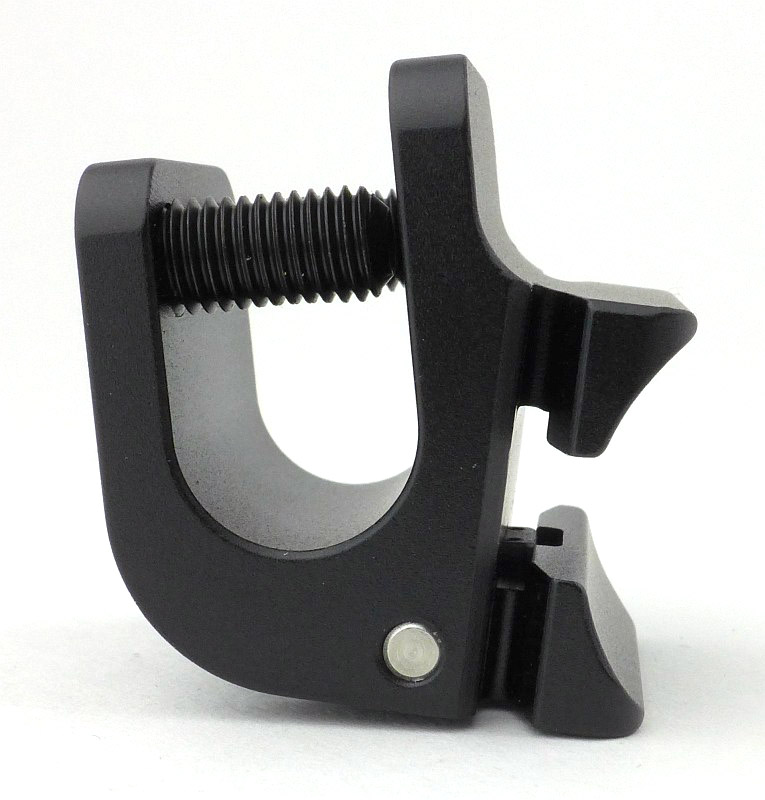
Something extra to mention while looking at the full pocket clip, is a feature that is visible bottom left in this photo; where the clip joins the body there is a slot. The pocket clip can be moved from side to side here, rotating the position of the clip around the body slightly and allowing the user to angle the Vantage 180 up to 15 degrees to either side while it is clipped to their gear.
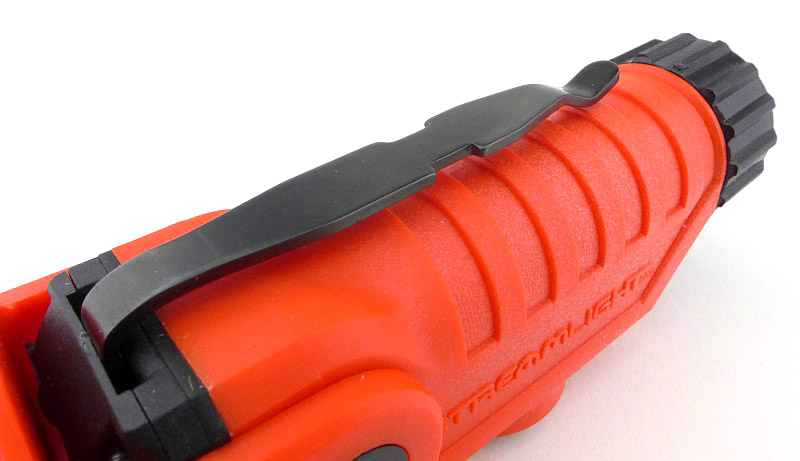
The feature of this clip that relates specifically to the helmet mount are the two notches each side of the clip. These are what the helmet mount latches on to so it doesn’t slide out of the mount,
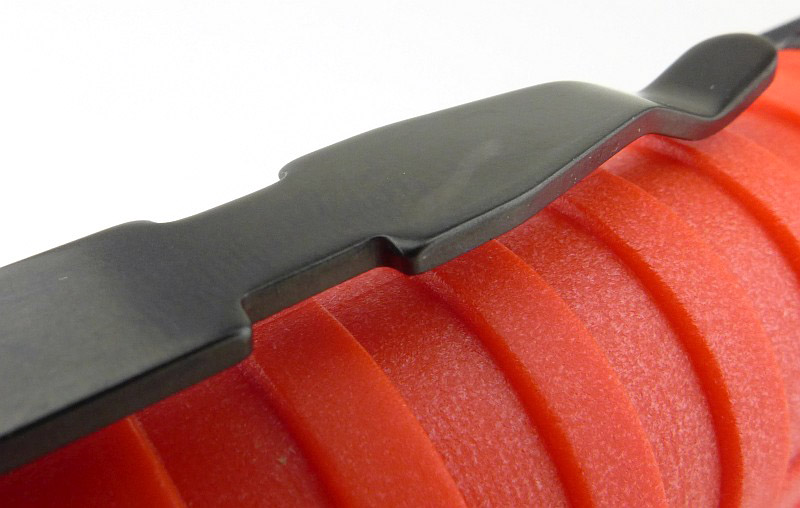
Starting to slide the Vantage 180 into the mount. From this side you can see the mount’s release lever.
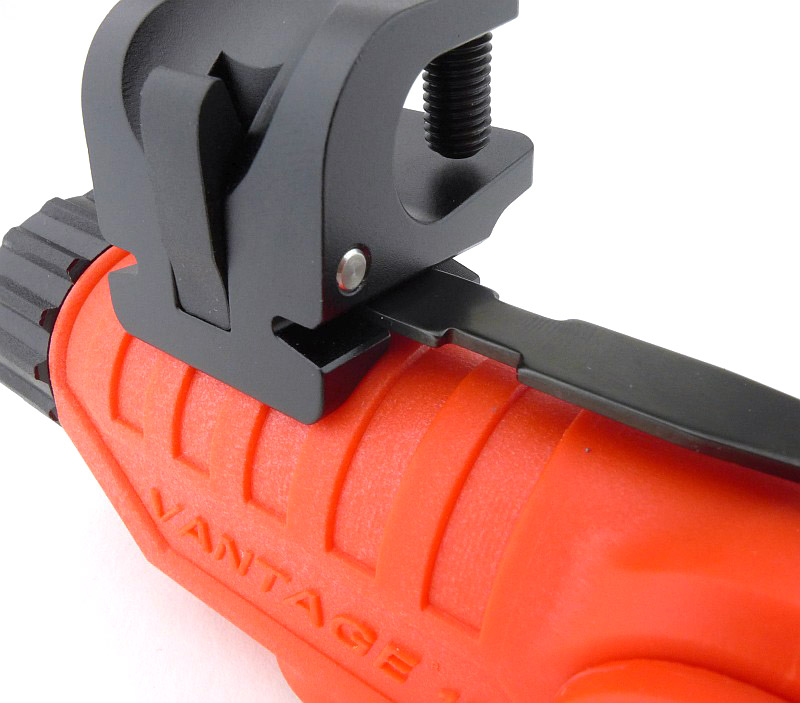
The mount is now locked in place on the clip.
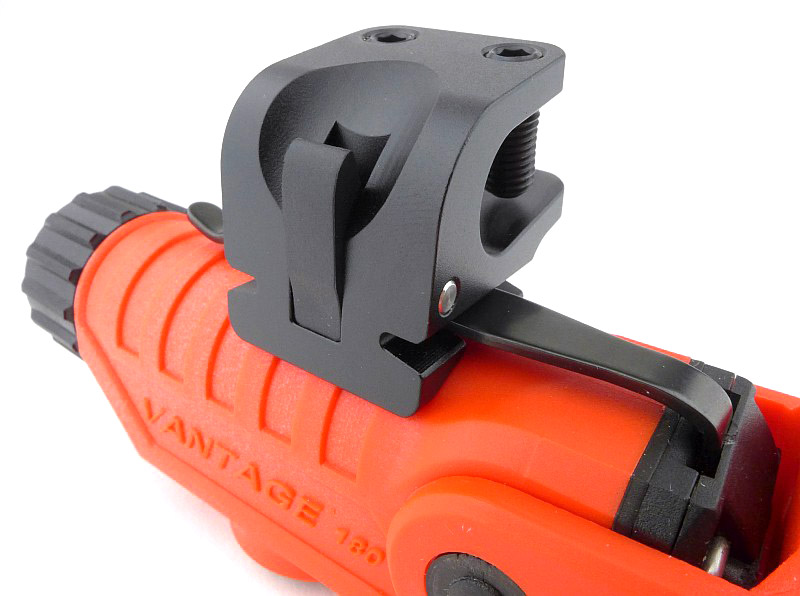
An overall view of the Vantage 180 fitted to the mount.
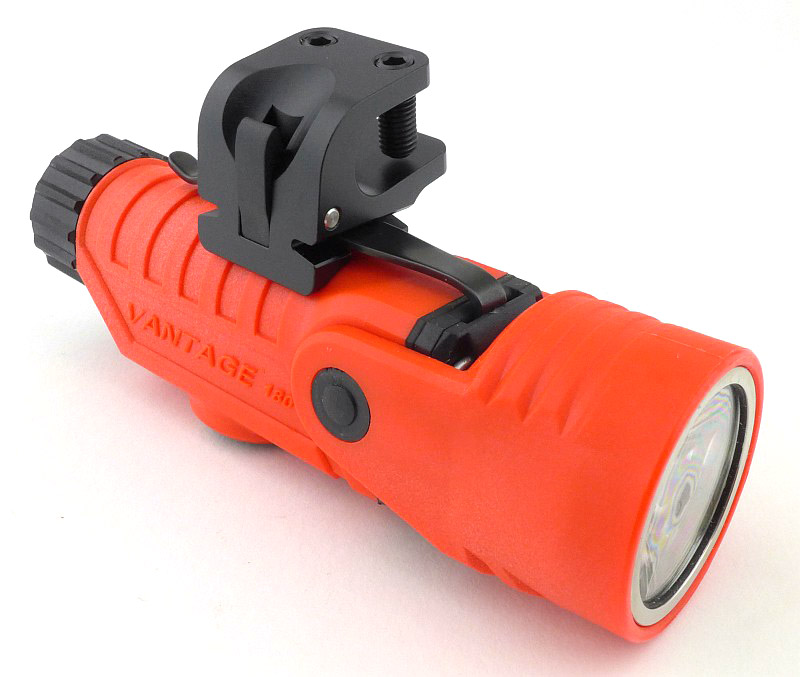
A brief reminder of the modes, and how to use them, is printed on the body (more on this later) along with the battery orientation.
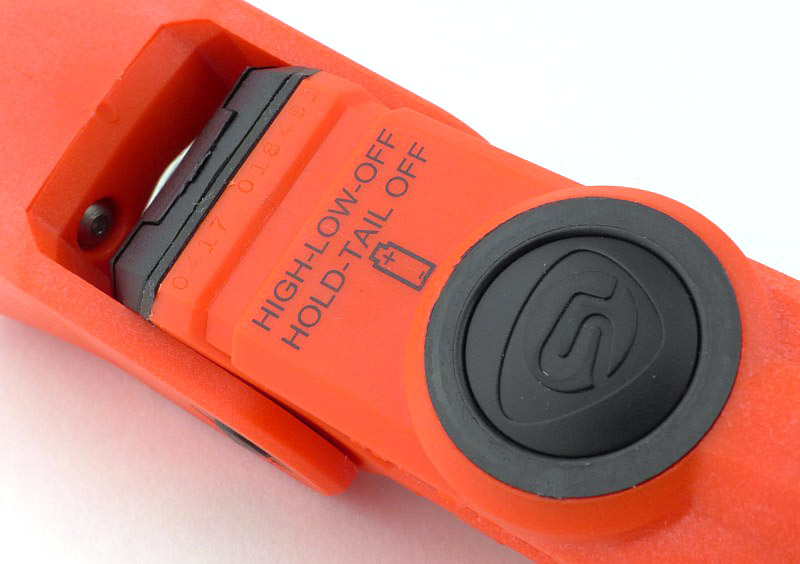
There is another special feature of the Vantage 180; it has two beams. This is the second beam, and is itself dual-purpose, either as a blue marker light, or a white secondary beam down-light (more on this later).
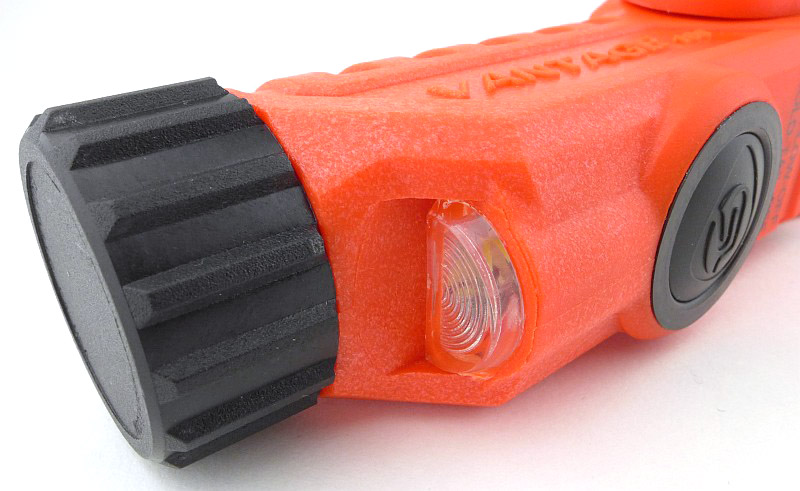
Here is a little mystery, I’ve not yet uncovered why there is an interference pattern visible (like oil on water) on the lens. It appears to be an additional layer on the lens front, but not one you are meant to remove, as there is no visible edge that would allow you to remove it. This doesn’t seem to affect the output in any way, so this is just an observation and appears to be normal.
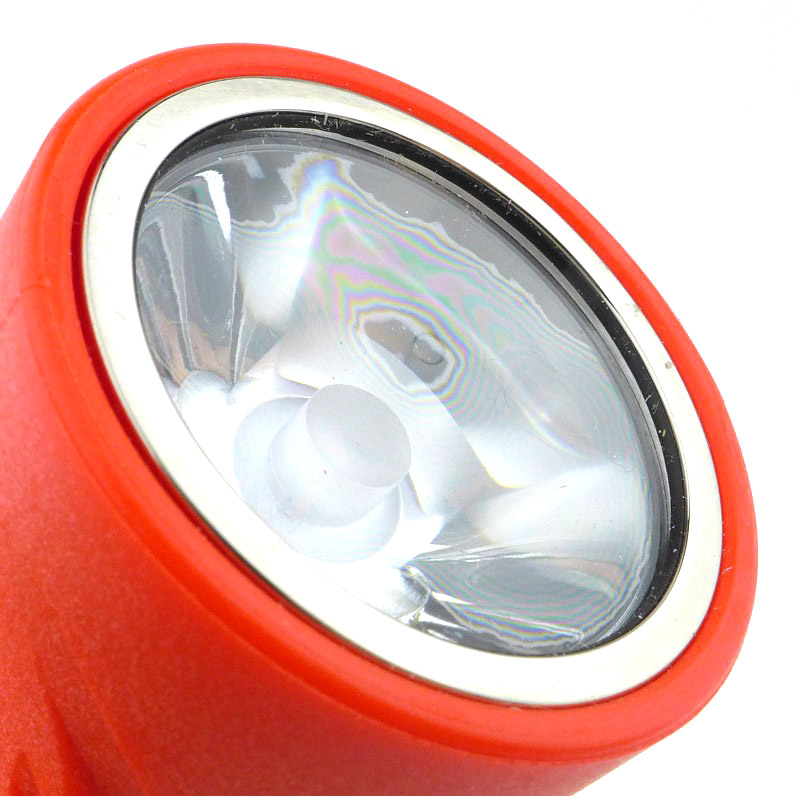
A TIR optic is used.
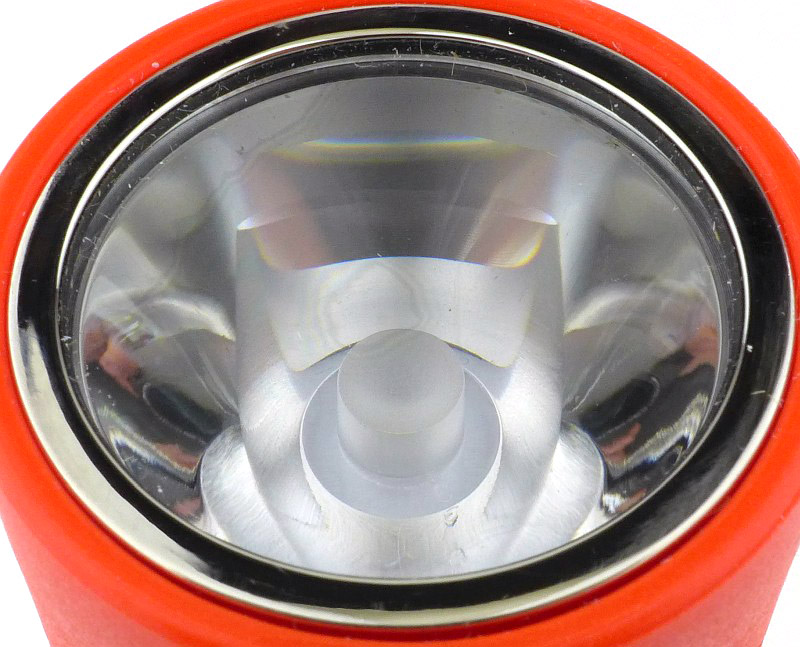
And this means that when viewed from the front, you can’t see the LED.
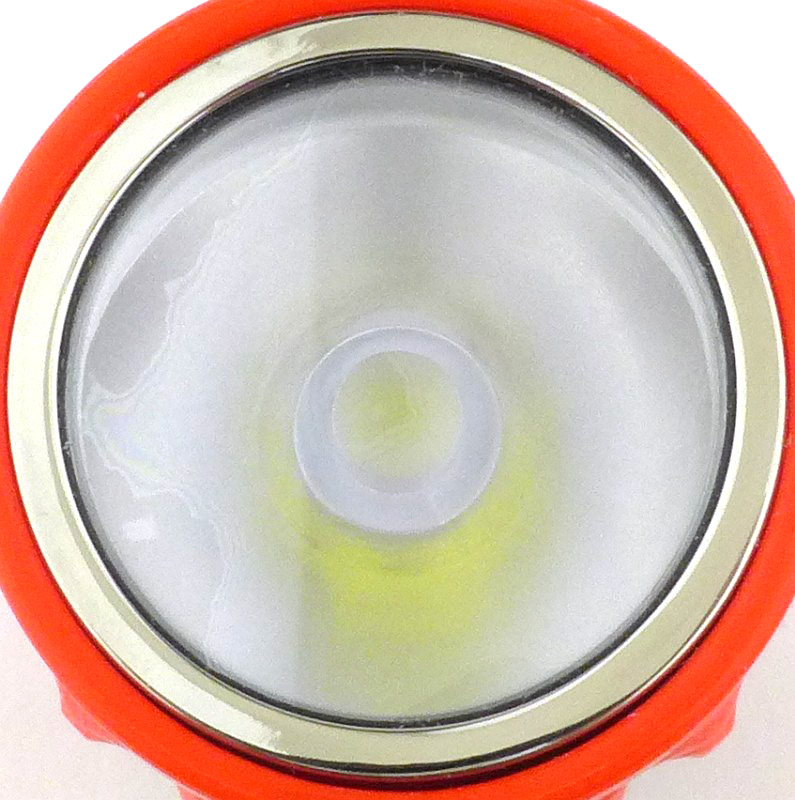
The tail-cap has a deep grip pattern making it easy to hold onto.
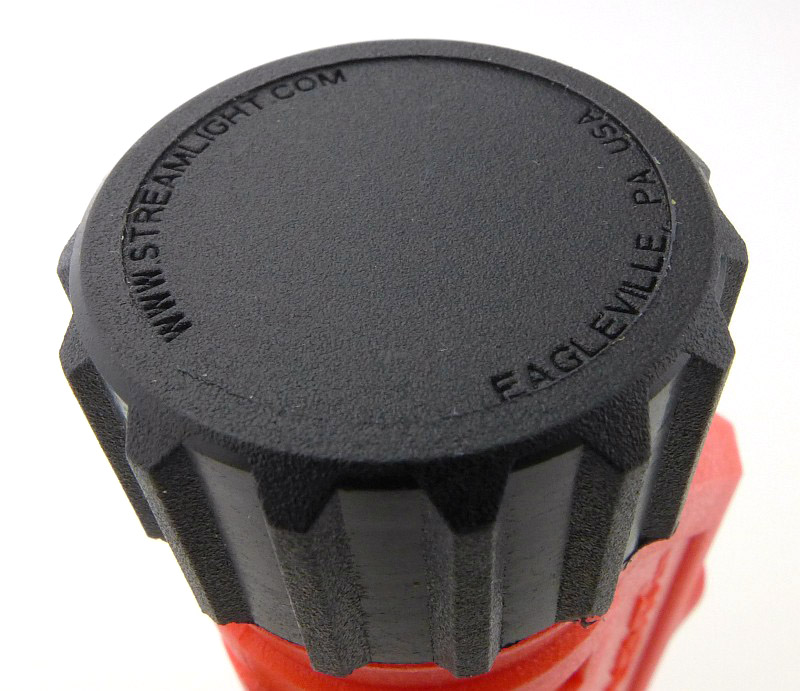
The simplest of contact design is used, with a single coil spring fitted into the plastic tail-cap.
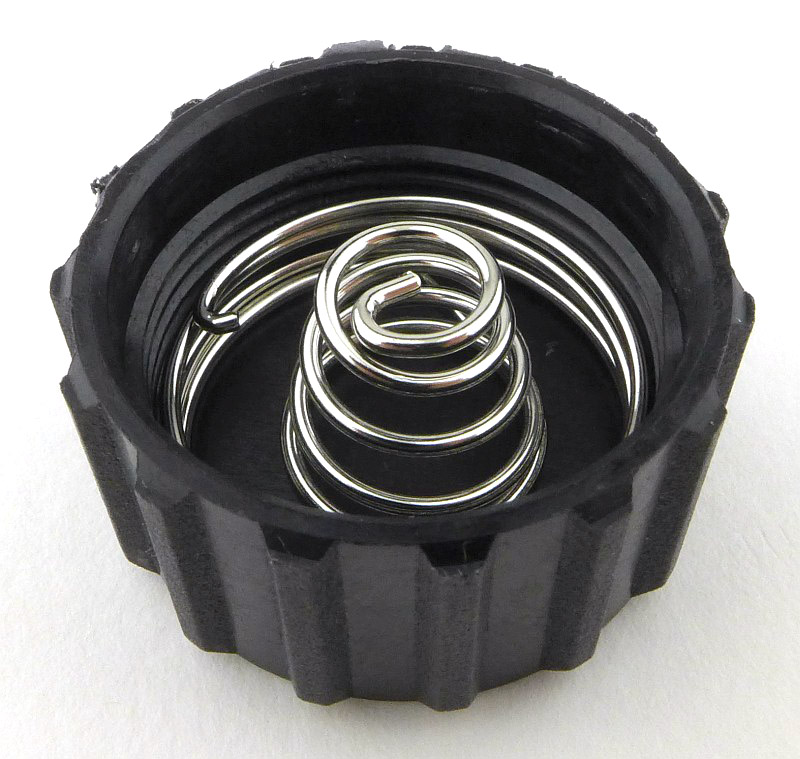
Though moulded plastic, the threads are sharp and well made. The O-ring is a wedge type.
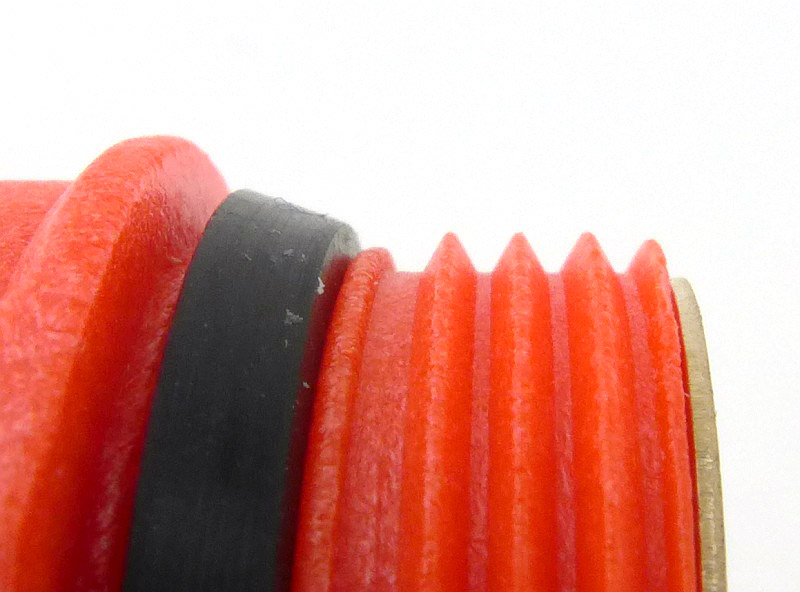
Being a plastic body, the negative contact needs to connect to the head of the light. This is via a ring contact at the end of the battery tube which is soldered to a metal strip that runs through the battery tube.
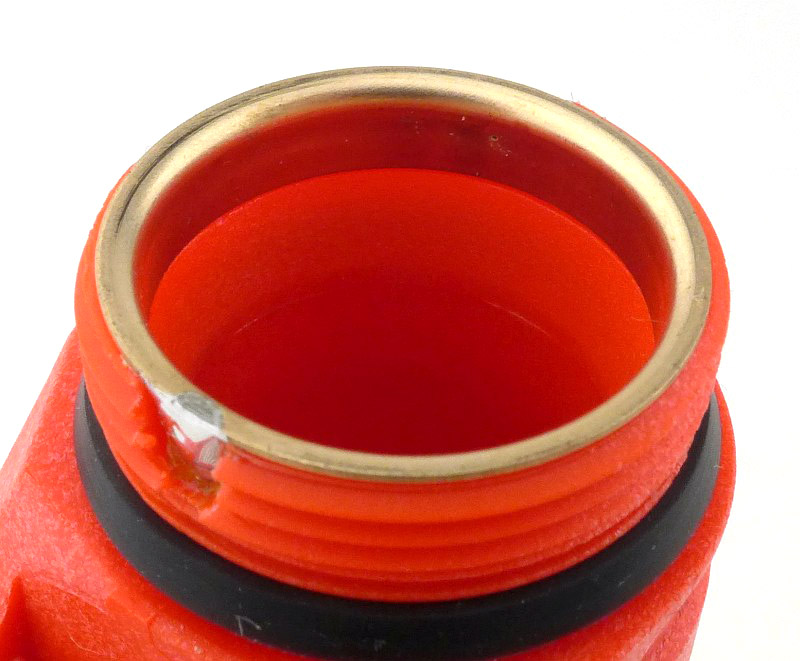
Looking into the battery tube you can see the positive contact.
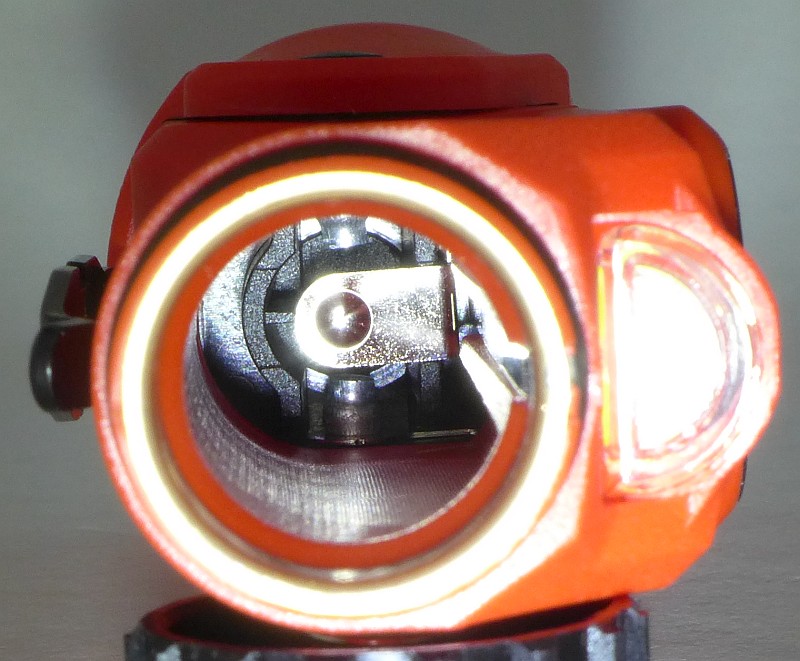
With the head adjusted to 90 degrees, the secondary beam provides downward lighting.
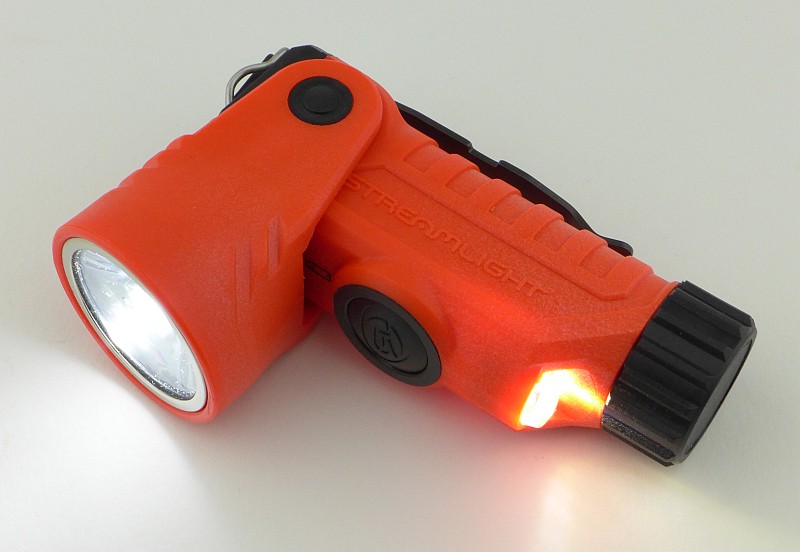
That same secondary beam, also changes to a blue marker light.
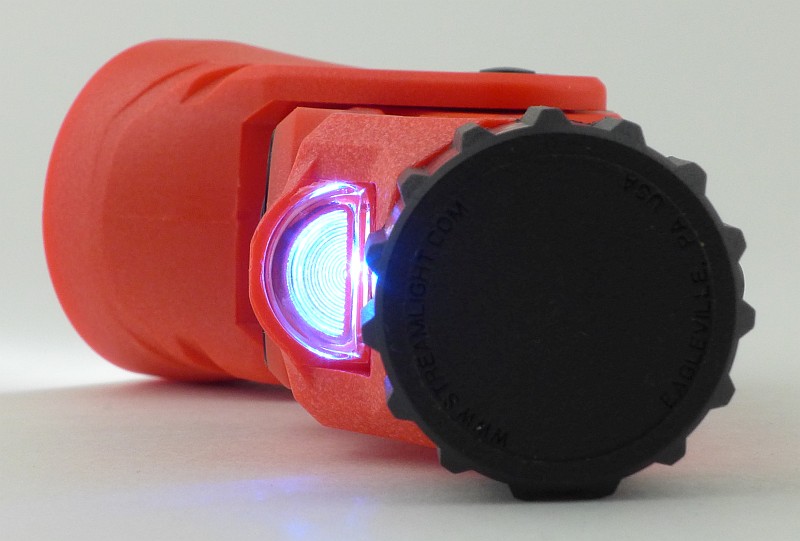
The beam
Please be careful not to judge tint based on images you see on a computer screen. Unless properly calibrated, the screen itself will change the perceived tint.
The indoor beamshot is intended to give an idea of the beam shape/quality rather than tint. All beamshots are taken using daylight white balance. The woodwork (stairs and skirting) are painted Farrow & Ball “Off-White”, and the walls are a light sandy colour called ‘String’ again by Farrow & Ball. I don’t actually have a ‘white wall’ in the house to use for this, and the wife won’t have one!
In this photo, the tail beam has been turned on and (with the head set to the straight position) is a relatively low output blue light.
The main beam is almost entirely hot-spot. The spill is useful, but is quite weak, so this can give a slight tunnel vision effect depending on the environment.
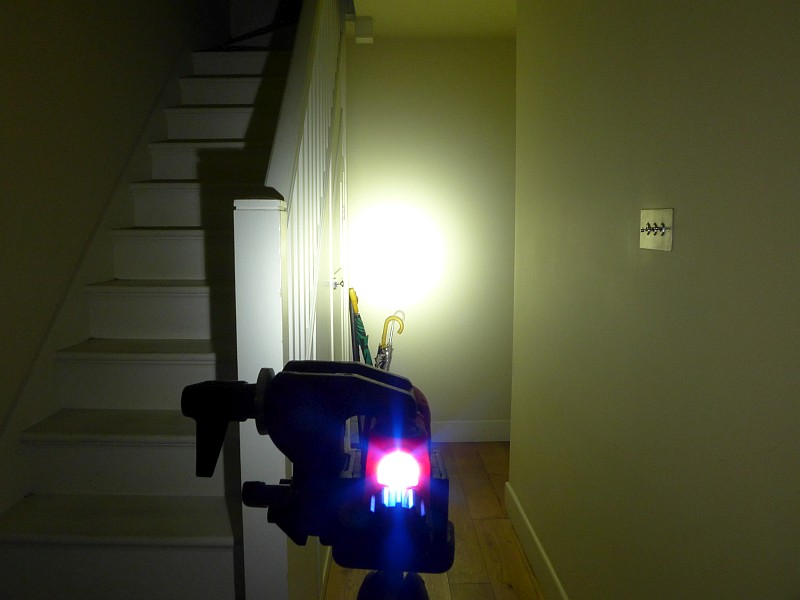
With more range the effect of the weak spill becomes more pronounced, and really the beam becomes just the hotspot.
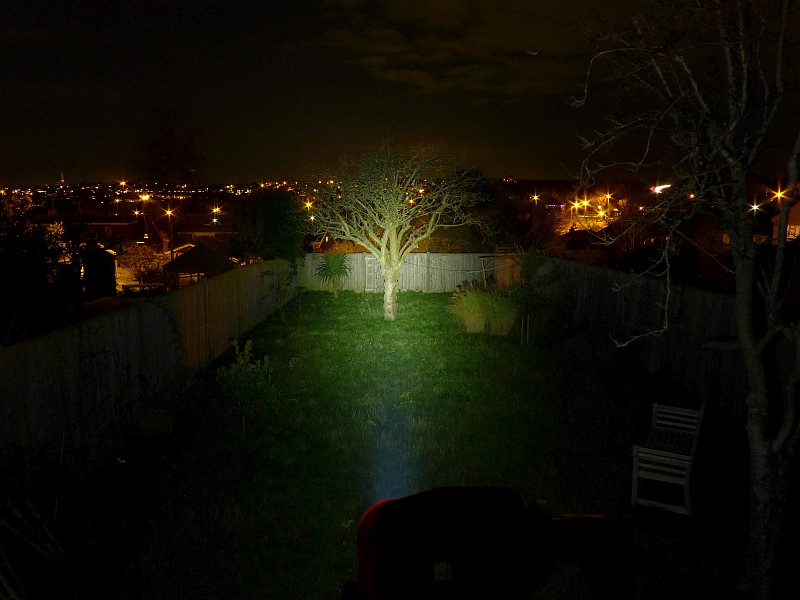
Modes and User Interface:
The Vantage 180 has two constant output modes for the main beam, High and Low, and two different outputs for the secondary beam, white and blue.
To access High, press the switch once. If you press the switch again within 2s, the Low mode will be selected. Pressing once more within 2s turns the Vantage 180 OFF.
If either High or Low mode is activated, once it has been ON for at least 2s, a single press of the button will turn the Vantage 180 OFF.
The secondary beam is set to be either ON or OFF along with the main beam. The secondary beam cannot be used independently and can only be on if the main beam is on. Its white/blue setting is dictated by the head position.
To set toggle the secondary beam between being ON or OFF, with the Vantage 180 either ON or OFF (it doesn’t matter), press and hold the switch for more than 2s.
With the head set to the straight position, the secondary beam will be blue.
Angling the head towards being a right-angle light, and when the head gets to around 72 degrees, the secondary beam switches from blue to a brighter white.
Batteries and output:
The Vantage 180 runs on 2x CR123.
To measure actual output, I built an integrating sphere. See here for more detail. The sensor registers visible light only (so Infra-Red and Ultra-Violet will not be measured).
Please note, all quoted lumen figures are from a DIY integrating sphere, and according to ANSI standards. Although every effort is made to give as accurate a result as possible, they should be taken as an estimate only. The results can be used to compare outputs in this review and others I have published.
| ___________________________________________ | ________________________________ | ________________________________ |
| Vantage 180 using specified cell | I.S. measured ANSI output Lumens | PWM frequency or Strobe frequency (Hz) |
| ___________________________________________ | ________________________________ | ________________________________ |
| High – CR123 | 269 | 0 |
| Low – CR123 | 98 | 0 |
* Beacon and Strobe output measurements are only estimates as the brief flashes make it difficult to capture the actual output value.
There is parasitic drain; when using CR123, the drain was 23.2uA (6.88 years to drain the cells). The tail-cap can be unscrewed two full turns to lock-out the power and stop any drain. However this is enough to prevent the seal being effective, so the Vantage 180 would not be water resistant like this.
The runtime graph shows a nicely regulated output giving nearly two hours on High before the output drops to the Low level. Beyond two and a half hours the output then rapidly declines before dropping to a 22 lumen level which runs on for some time. The Vantage 180 doesn’t leave you in the dark and provides plenty of warning for a battery change.
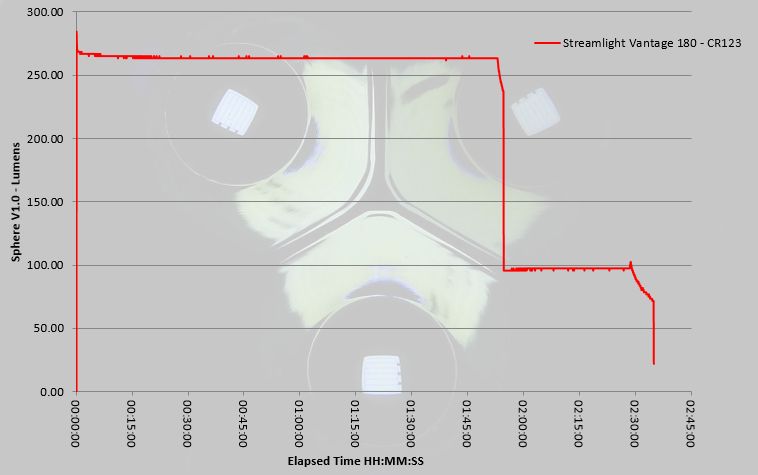
Troubleshooting
This section is included to mention any minor niggles I come across during testing, in case the information helps anyone else.
No issues were encountered during testing.
As per the description of this section, this information is provided in case anyone else finds a similar ‘issue’ that might be fixed in the same way.
The Vantage 180 in use
Streamlight always manage to build in a great deal of functionality into lights like this, and the Vantage 180 does not disappoint. To start with, the ability to go from a conventional straight torch/flashlight to a right-angle light, or anywhere in between, is so useful. Even if this is when placing the Vantage 180 on a table or the ground to use as a task light, being able to adjust the head, allows it to work where a fixed head light just wouldn’t be much use.
Add to this the clip (with its own adjustment of 15 degrees each way) and hanging loop, and you have a highly functional work light, that will fit into just about any task you need to do.
Then there is the secondary beam. The blue tail-light is mainly for increasing your visibility to others, and this is mainly aimed at Emergency Response personnel who would wear the Vantage 180 on their helmet. For my own purposes, I can’t really think of a sensible use for this blue marker light.
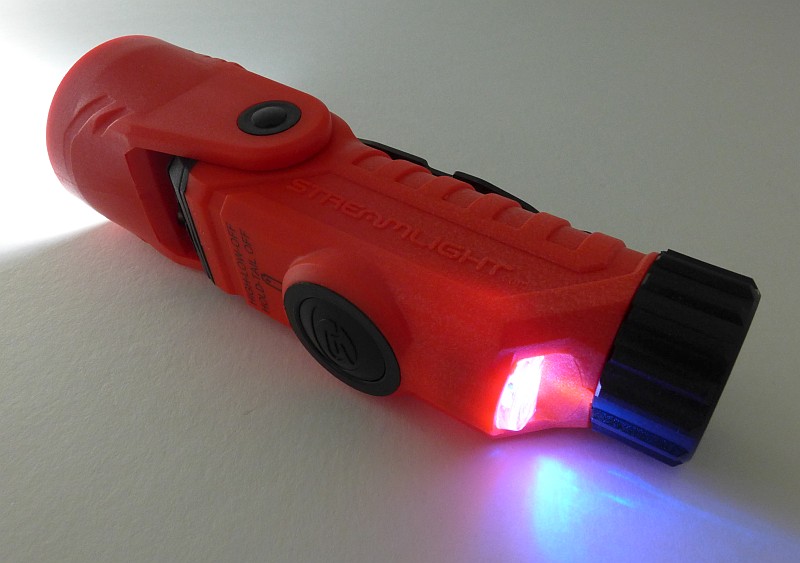
However, rotate that head to activate the down-light, and the Vantage now has ground lighting along with the main beam if you have this fitted to your clothing (or lighting to let you see what you are writing etc.).
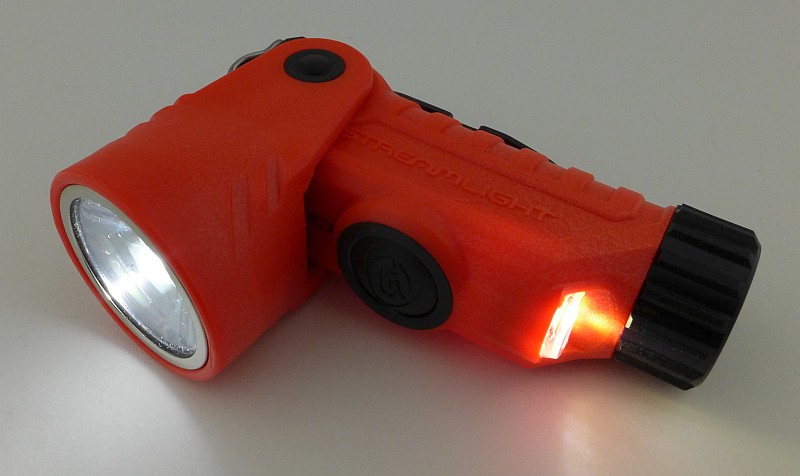
But we are not yet finished as there is that solid helmet mount. So as long as it fits the helmet you are using, or can be made to fit) you have a headlamp as well.
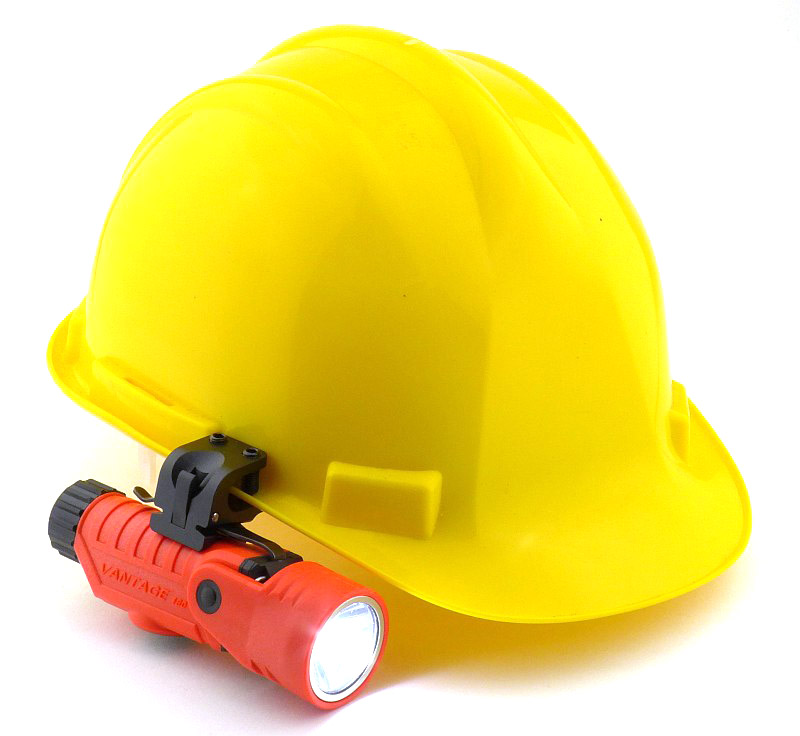
In this case it has been fitted to a basic hard-hat and nicely holds onto the rim.
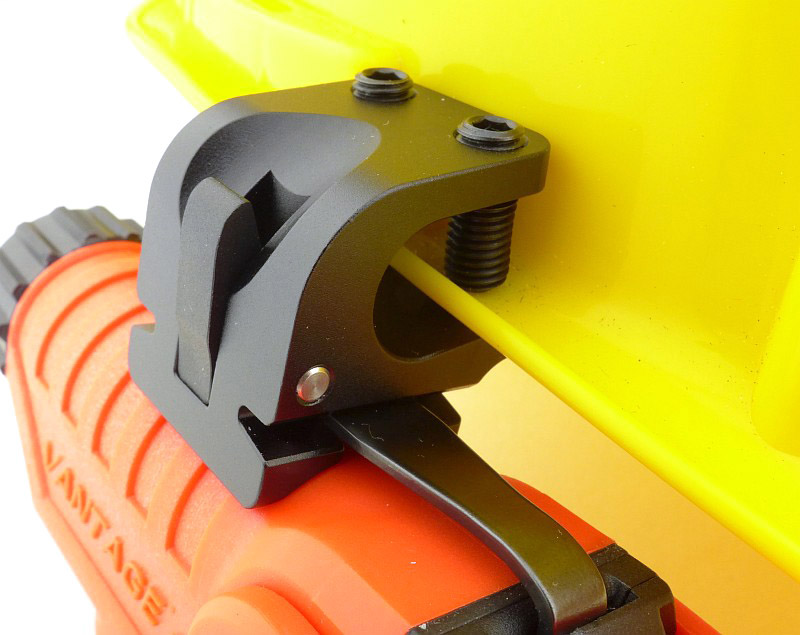
Not everyone will use every feature of the Vantage 180, but you know that it has all that flexibility built-in which provides you with a lot of options.
Review Summary
| _______________________________________________ | _______________________________________________ |
| Things I like | What doesn’t work so well for me |
| _______________________________________________ | _______________________________________________ |
| Full 180 Degrees of head Rotation. | Weak spill beam. |
| Secondary tail-light / down-light. | Doesn’t use rechargeable batteries. |
| Clip can be adjusted 15 degrees either way. | Only two output levels. |
| Helmet mount included. | |
| Hanging loop built-in. | |
| Unbreakable TIR optic. | |
| Well regulated output. |
Discussing the Review:
The ideal place to discuss this reviews is on a forum. If you started reading the shorter forum version of the review, but followed the link this full exclusive review, please return to that forum to discuss the review there.
If you read the review entirely on Tactical Reviews, please consider one of the following to join in any discussion.
CandlePowerForums – Flashlight Reviews Section (Largest and Friendliest Flashlight Community Forum)


